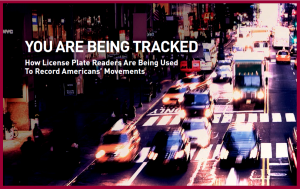License plate recognition technology is a tool that helps law enforcers solve crimes and save lives, according to a new survey of law enforcement professionals. However, license plate readers mounted on police cars or on road signs and bridges, use small, high-speed cameras to photograph thousands of plates per minute as federal and state governments continue their relentless pursuit of spying and abusive data collection, according to critics. The TSA is subsidizing the technology under the Obama Administration through grants to buy the readers.
The information captured by the readers – including the license plate number, and date, time, and location of every scan – is being collected and sometimes pooled into regional sharing systems, according to the ACLU. As a result, enormous databases of innocent motorists’ location information are growing rapidly. This information is often retained for years or even indefinitely, with few or no restrictions to protect privacy rights. ACLU is calling for legislation to curb the privacy abuses.
Automatic license plate readers have the potential to create permanent records of virtually everywhere any of us has driven, radically transforming the consequences of leaving home to pursue private life, and opening up many opportunities for abuse. The tracking of people’s location constitutes a significant invasion of privacy, which can reveal many things about their lives, such as what friends, doctors, protests, political events, or churches a person may visit, according to ACLU. The NSA controversy has now heightened public awareness after the Edward Snowden revelations.
In addition to funding state and local purchases of license plate readers, some federal agencies maintain their own networks of license plate readers across the United States. They are conducting data sharing on a national level.
According to a growing number of critics, little is known about how the federal government uses license plate data. ACLU has filed Freedom of Information Act requests with the Departments of Justice, Homeland Security, and Transportation, but not surprisingly received few voluntary responses. A federal lawsuit is now pending that could force the departments to respond.
ACLU says:
- Customs and Border Protection uses license plate readers to scan the license plates of almost every car entering the United States, as well as many cars leaving the country.
- Immigration and Customs Enforcement has experimented with operating license plate readers as well. It has also looked into purchasing access to private repositories of plate data.
- The Drug Enforcement Administration had deployed cameras in Arizona, Texas, New Mexico, and California as of 2012, and was working to expand its network of license plate readers throughout the northern and southern borders, as well as in “hub cities and the high-traffic corridors.”
The pro LPR survey, conducted by Vigilant Solutions – which makes money selling the privacy threatening technologies – on behalf of NetChoice, a pressure group favoring online commerce at all costs, also claimed that there are protections in place to prevent against LPR misuse.
The survey polled 504 law enforcement people from around the country regarding their agencies use of LPR technology. More than 87% of respondents said that LPR technology had been instrumental in investigating crimes and more than 60% reported that LPR had saved lives in their community.
“Opponents of LPR technology are basing their fears on hypothetical behaviors that don’t appear to exist in the real world,” claims Steve DelBianco, executive director of NetChoice. “The survey reveals a life-saving technology, subject to strict rules, that has become a mainstay of criminal investigations. To the extent that LPR – like any technology – carries the potential for misuse, lawmakers and advocates should focus their efforts on bad behaviors, not good technology.”
More than 99% of the law enforcement officers polled said that they knew of no instances in which colleagues misused LPR data. (Of course to so would be admitting to potentially illegal acts.) More than 90% reported that abusing LPR technology for personal purposes would cost them their jobs.
DelBianco said the findings point to a technology marketplace that is working precisely as it should.
“Technology mandates are almost never a good idea,” DelBianco said. “Again and again we’ve seen that the technology marketplace evolves to meet challenges faster and more elegantly than the legislative process ever could.”


